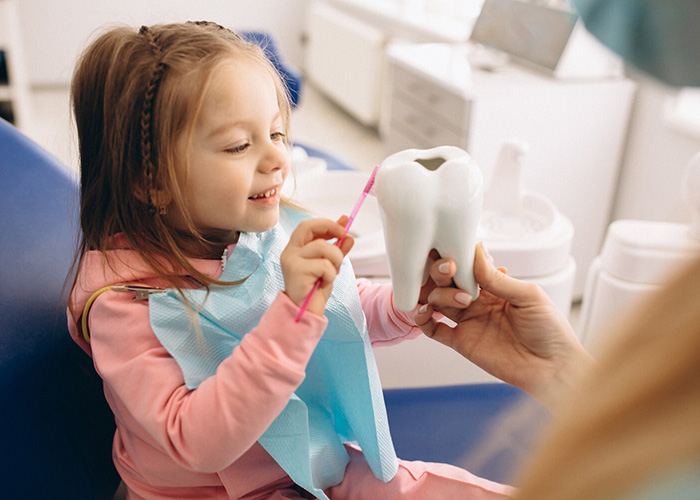Safety Net in Pediatric Dentistry: Encouraging Healthy Practices for Stronger Teeth and More Vibrant Smiles
In the realm of pediatric dentistry, promoting safety nets plays an essential role in growing a structure for long-lasting dental health and wellness. As kids's teeth are prone to degeneration and different dental problems, instilling healthy routines from an early age is critical. From the significance of regular oral brows through to reliable dental health methods and the role of fluoride in preventative treatment, there exist crucial techniques that can considerably impact a child's oral wellness. kid dentist near me. The journey to advertising stronger teeth and brighter smiles expands beyond these fundamental techniques. Remain tuned to discover just how an alternative method to pediatric dental care can lead the way for a life time of optimal dental health.
Significance of Very Early Dental Sees
Early dental visits play a vital role in establishing a structure for optimal oral health and wellness in children. Presenting youngsters to the dental professional at a very early age not only aids to prevent dental concerns however additionally fosters a positive perspective towards oral treatment. The American Academy of Pediatric Dental care advises that a child must have their very first oral check out by the age of one or within 6 months of the eruption of their very first tooth. These very early visits allow dental experts to monitor the growth and development of the kid's teeth, determine any potential problems, and provide guidance on proper dental hygiene techniques.
Furthermore, very early dental visits aid to familiarize children with the oral atmosphere, reducing anxiousness and concern connected with oral visits in the future - pediatric dentist. By developing an oral home at an early stage, moms and dads can access important information on nourishment, fluoride use, and precautionary like guarantee their youngster's teeth remain healthy and solid. Generally, early oral brows through are important in advertising good dental health routines and preventing oral problems in youngsters

Reliable Dental Health Practices
What are the crucial concepts behind preserving effective dental hygiene practices for pediatric dental treatment? Developing excellent dental hygiene practices from a young age is important for stopping dental issues in children. Cleaning teeth at the very least two times a day utilizing fluoride toothpaste is fundamental. Moms and dads must help their kids in brushing till they can do it properly on their very own, normally around the age of 6 or 7. Flossing ought to also be included right into the everyday routine to get rid of food bits and plaque between teeth. Furthermore, regular oral examinations every six months are important to keep an eye on oral wellness and address any kind of worries at an early stage. Encouraging a well balanced diet reduced in sugary snacks and drinks even more advertises healthy teeth. Limiting sweet treats to nourishments can help in reducing the risk of dental caries. Showing children the value of dental health through positive support and leading by instance establishes the foundation for a life time of excellent oral behaviors and makes sure brighter smiles for years ahead.
Function of Fluoride in Preventive Treatment
In the realm of pediatric dental care, the incorporation of fluoride plays a critical role in precautionary procedures intended at preserving optimum dental health. Fluoride is a naturally happening mineral that assists protect against tooth degeneration by making the enamel extra immune to acid strikes from plaque bacteria and sugars in the mouth. When children are exposed to fluoride through sources like fluoridated water, toothpaste, or professional treatments, it can strengthen their teeth and prevent cavities.
The benefits of fluoride in preventive care extend beyond just children; it is a fundamental element in promoting oral health and wellness for people of any ages. Neighborhood water fluoridation, particularly, has actually been acknowledged as one of one of the most efficient public health measures for preventing cavities. By incorporating fluoride into regular oral treatment regimens, both in your home and skillfully, parents and caregivers can aid make certain that kids navigate to these guys establish strong and healthy and balanced teeth that will certainly last a lifetime.
Nutrition Tips for Dental Health

Urging Favorable Dental Behaviors
To better strengthen the structure of great oral health and wellness developed through well balanced nutrition, instilling favorable oral routines in kids is a vital element of pediatric dental care. Encouraging kids to comb their teeth at the very least twice a day for two mins each time is crucial. Moms and dads need to manage brushing until the youngster can successfully brush on their own, usually around the age of 6 or find out here now 7. Making use of fluoride tooth paste in the appropriate quantity aids enhance enamel and avoid cavities. Flossing should additionally be introduced as quickly as there are 2 teeth touching each various other to avoid plaque accumulation in those locations. Normal dental examinations every 6 months help in early discovery of any kind of dental concerns and promote a favorable perspective towards dental gos to. Restricting sweet treats and beverages, specifically before going to bed, can significantly minimize the risk of dental caries. By developing these favorable oral routines early, kids can maintain solid teeth and brilliant smiles for several years ahead.
Final Thought
In final thought, very early dental visits, efficient oral health methods, fluoride use, correct nutrition, and positive dental behaviors play vital duties in promoting pediatric dental wellness. pediatric dentistry oakland. By integrating these safety nets right into daily regimens, children can establish healthier teeth and brighter smiles for a life time. It is important for moms and dads, caretakers, and doctor to function together in cultivating these routines to guarantee optimal oral health and wellness outcomes in children